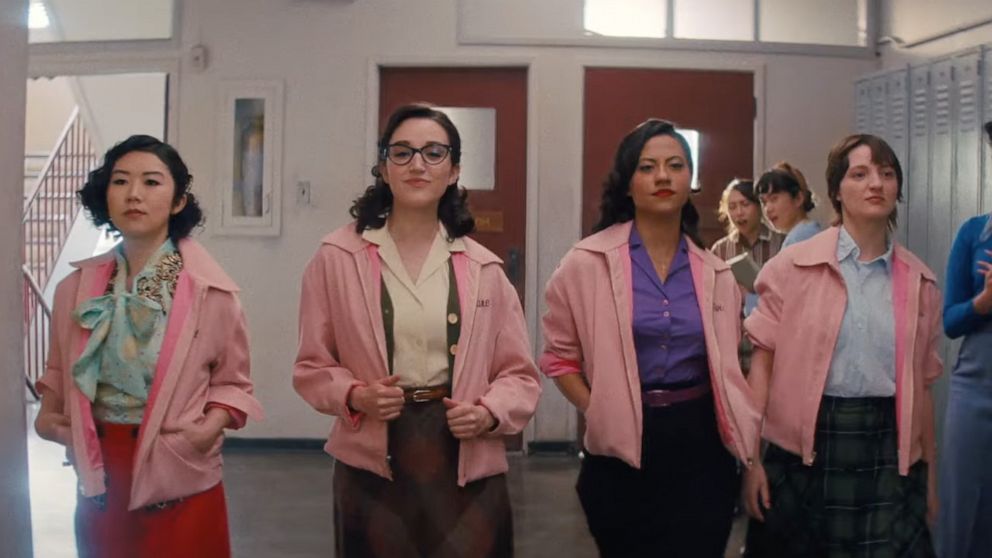I’ll be the first to admit that when I first heard about the Paramount+ Grease prequel show, Rise of the Pink Ladies a few months ago, my expectations for it were very low. After all, experience has taught me that prequels, sequels, and reboots rarely manage to live up to the charm of the source material. Too often, they’re easily forgotten productions that, in some cases, people don’t even know about — yes, I’m talking about Grease 2, which came out in 1982, four years after the beloved original film that, despite Michelle Pfeiffer’s best efforts, ended up being a huge flop.
Despite my initial concerns, I knew I’d give Rise of the Pink Ladies a fair chance – mostly because the Pink Ladies were always my favorite characters from the original film, seeming way more fun than Sandy. A few minutes into the first episode I was sold. First, it was the updated version of the iconic Grease theme song (followed by some very catchy new original songs), then it was the costumes that were so perfectly curated to appeal to both 1950s and 2020s aesthetics, and lastly, it was the nostalgia — Grease was the first musical I performed in when I was in school. I was immediately hooked.
Rise of the Pink Ladies follows the story of four misfits who eventually become the four founding members of the famous girl gang. Specifically, we have “new girl” Jane Facciano, “bad girl” Olivia Valdovinos, “tomboy” Cynthia Znudowski, and Nancy Nakagawa, the “creative and misunderstood” one. What surprised me the most (in the absolute best way possible) was the fact that two out of the four original Pink Ladies are Latinas. The series follows these four young women as they navigate their teenage years in a society that pushes them to fit into neat little boxes, even if those boxes don’t accurately portray their personalities. I quickly realized that, while the show is set in 1954 (four years before the events of the original film), the themes and storylines it features are incredibly current and modern.
Jane Facciano (played by Marisa Davila) is an Italian-Puerto Rican, straight-A student who’s introduced as “the new girl” at school. At the beginning, she’s shown as the new girlfriend of Rydell High’s golden boy Buddy Aldrige. This new relationship is quickly tested when rumors about Jane and Buddy “going all the way” start circling. After realizing Buddy is a little bit too comfortable letting everyone believe they had sex (instead of setting them straight), she breaks off the relationship. With her reputation in shambles, Jane is free to explore who she is outside of her good-girl image. One of the things she starts exploring is her Latinidad, as most of her teachers and classmates only know about the Italian side of her heritage (this is mainly due to her mom’s fear of her daughters Jane and Francesca — yes, Francesca as in Frenchie. Frenchie is a Latina! — experiencing the same discrimination and hardships she went through as a Latina in the 50s).
If Jane is Rydell’s resident “good girl” then Olivia (Cheyenne Isabel Wells) is the school’s de facto “bad girl.” She is the disgraced, former straight-A student who got caught having an illicit romance with her math teacher. Olivia is first presented in the stereotypical “Spicy Latina” way that I have come to hate: because of her heritage, she’s made out to be a hot-headed, sexually deviant young woman who seduced her male teacher (instead of being treated as a minor that was groomed by the aforementioned adult who also happened to have a girlfriend). And now she is getting punished — both socially and academically — for it.
Despite both of them being introduced in the same stereotypical way that the female leads in the original Grease were, one of the main differences between Grease and Rise of the Pink Ladies is how both Jane and Olivia (and actually, all the women in the series) manage to subvert — even mock — these outdated tropes. They are not simple, one-dimensional characters. While we do get the “good girl,” “bad girl,” “tomboy”, “creative,” and “popular and mean girl” characters, we also get to see a glimpse of who each of these young women are outside of those tropes.
Sure, Olivia is the “sexy” senior (her storyline and wardrobe choices remind me a bit of Rizzo’s actually), but she’s also a great writer and reporter for Rydell’s newspaper. She was in the advanced math class and got taken out to make sure her teacher was comfortable after their affair was discovered. She even turns out to be a very savvy campaign manager for Jane’s student council president campaign.
And, yes, Jane’s the nerdy Italian at first glance, but that’s not all there is to her. She’s also a strong Latina who’s not afraid of challenging Buddy for student-body president. She defies the status quo and actively seeks to create positive change for herself and those around her (even if her actions backfire sometimes).
This Grease sequel feels modern while keeping the charm that made the original film so iconic. The entire first season is now streaming on Paramount+ and I, for one, am really hoping it gets picked up for a second season.

